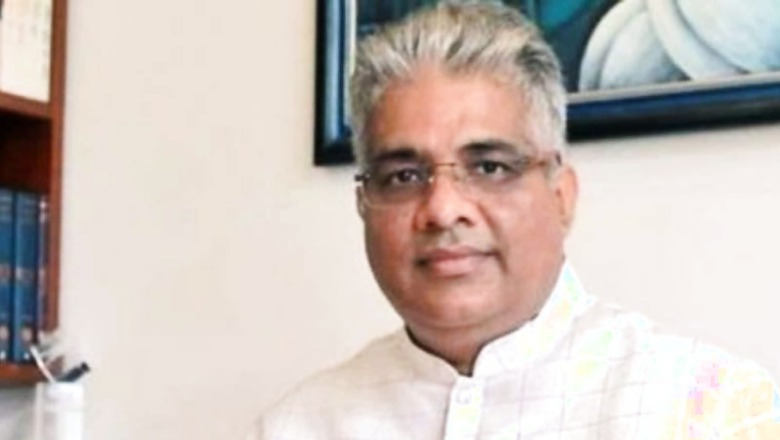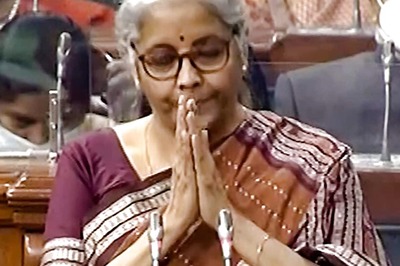
views
Developing countries, including India, are highly vulnerable to climate change impacts, Union Environment Minister Bhupender Yadav said on Wednesday while reiterating that the upcoming 26th UN conference on climate change (COP26) should focus on climate finance, along with development and transfer of technologies from the developed nations.
In his virtual address at the National Conference on COP26 Charter of Actions, organised by TERI, the minister said India’s population is dependent on climate sensitive sectors for their livelihoods and concerted actions are required on the part of the public as well as the private sector.
“Developing countries are highly vulnerable to climate change impacts. India’s large population is dependent on climate sensitive sectors for their livelihoods. The fight against climate change cannot be undertaken by the government alone. Private sector companies should be encouraged in developing breakthrough technologies and mobilising finance,” he said.
Yadav said ambitious climate action in developing countries is dependent on enhanced support from the developed countries under the Paris Agreement.
“India has repeatedly called upon the developed countries to fulfil their promise of the USD 100 billion per year goal. In this regard, COP26 should focus on climate finance in scope, scale and speed, along with development and transfer of technologies and capacity-building support,” he added.
Asserting that climate change is the defining issue confronting humanity right now, the minister said the need of the hour is a comprehensive set of actions within socio-economic and developmental contexts.
“Concerted actions are needed in terms of cooperation between all countries, especially with the developed countries taking a lead in climate actions through mitigation, adaptation and providing support to the developing countries in terms of climate finance, capacity building and technology transfer.
“The recently released report by the Intergovernmental Panel on Climate Change (IPCC) has sounded alarm bells louder than ever and it is a clarion call for the developed countries to undertake immediate deep emission cuts,” he said.
Lauding the efforts of The Energy and Resources Institute (TERI) for preparing the “COP26 Charter of Actions”, Yadav said, the “document has taken a holistic approach, touching upon issues closely aligned with India’s priority areas, including on issues related to equity, energy, climate finance, adaptation and resilience, business and industry, and clean transport, all of which are important areas to drive climate action as far as India is concerned”.
“I am confident that this initiative will provide directions for charting a course for equitable and sustainable climate actions in India and for the world,” he added. Yadav said India is a committed constituent of the United Nations Framework Convention on Climate Change (UNFCCC) and the Paris Agreement.
“I am hopeful for a successful and balanced outcome at COP26,” he said. UNFCCC COP26 on climate change is scheduled to be held in Glasgow, United Kingdom from October 31 to November 12, where leaders of nearly 200 countries will gather to discuss the way forward to tackle climate action and submit their updated targets.
Throwing light on the actions taken by India to tackle climate change, Yadav cited several initiatives such as the implementation of the National Action Plan on Climate Change (NAPCC), the National Adaptation Fund on Climate Change (NAFCC), the Pradhan Mantri Ujjwala Yojana, the Faster Adoption and Manufacturing of (Hybrid and Electric) Vehicles in India scheme, the setting up of the International Solar Alliance, the Coalition for Disaster Resilient Infrastructure, the Leadership Group for Industry Transition, putting in place an ambitious National Hydrogen Mission and the continuing efforts to decouple its emissions from economic growth.
He said India has an aspirational target of installing 450 GW of renewable energy by 2030. The Indian Railways has set a target of becoming a “Net Zero Carbon Emitter” by 2030.
India is a party to the UNFCCC, its Kyoto Protocol, and the Paris Agreement and has submitted its NDC outlining its targets for 2021-2030, including to reduce the emission intensity of its GDP by 33 to 35 per cent by 2030 from the 2005 level, to achieve about 40-per cent cumulative electric power-installed capacity from non-fossil fuel-based energy resources by 2030 with the help of transfer of technology and low-cost international finance and to create an additional carbon sink of 2.5 to 3 billion tonnes of CO2 equivalent through additional forest and tree cover by 2030. Presently, India accounts for 7.1 per cent of global emissions.
Read all the Latest News , Breaking News and IPL 2022 Live Updates here.

















Comments
0 comment